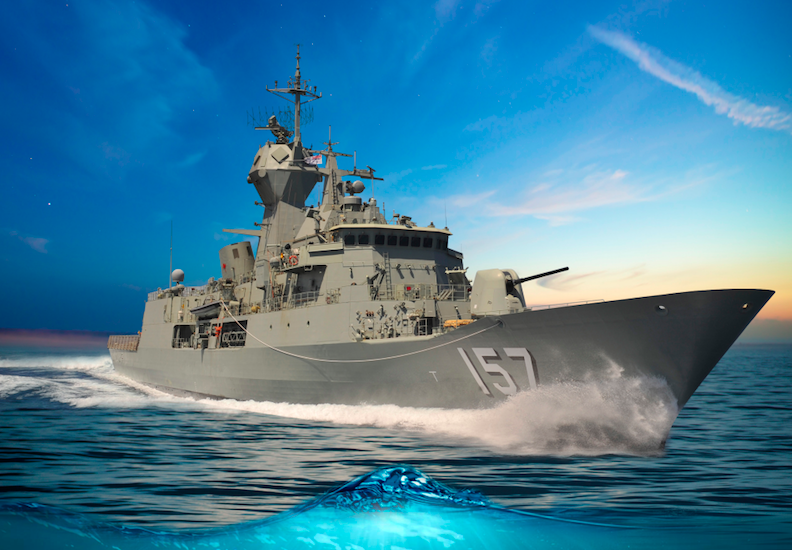Highlights from ASPI’s Future Surface Fleet: day 1
Posted By Amelia Long on March 31, 2015 @ 15:14
 [1]ASPI’s Future Surface Fleet Conference [2] kicked off this morning, with major speeches reflecting a range of positions and political debate. Opening the conference, ASPI Executive Director Peter Jennings lamented the hardline politics of shipbuilding in Australia and offered five objectives to help frame decisions regarding Australia’s future frigate fleet: to make a decision based on Australia’s strategic need; to be cognisant of Australia’s changing strategic environment; take the heat out of domestic politics; for industry to engage government on industry’s role; and to think about integration challenges across the ADF and with friends and allies. He was followed by Minister for Defence Kevin Andrews, who today has given a more detailed roadmap of the government’s thinking on naval ship building—in particular, on the future of the SEA 5000 project. Here are some of the key points from his speech:
[1]ASPI’s Future Surface Fleet Conference [2] kicked off this morning, with major speeches reflecting a range of positions and political debate. Opening the conference, ASPI Executive Director Peter Jennings lamented the hardline politics of shipbuilding in Australia and offered five objectives to help frame decisions regarding Australia’s future frigate fleet: to make a decision based on Australia’s strategic need; to be cognisant of Australia’s changing strategic environment; take the heat out of domestic politics; for industry to engage government on industry’s role; and to think about integration challenges across the ADF and with friends and allies. He was followed by Minister for Defence Kevin Andrews, who today has given a more detailed roadmap of the government’s thinking on naval ship building—in particular, on the future of the SEA 5000 project. Here are some of the key points from his speech:
Future Surface Fleet Capabilities
Andrews outlined the prospective capabilities of the future frigates, emphasising that:
‘The Future Frigates are expected to face more demanding operational requirements and will need to be more capable than the ANZAC class. They will be required to conduct a range of missions, from low-level constabulary roles through to regional conflict, but with a particular focus on anti-submarine warfare and theatre-level anti-submarine operations.’
According to the Minister, operations along Australia’s coastline and in the Indo-Pacific will require Australia’s future frigate to ‘have the range, endurance, sea-keeping qualities, survivability and weapons load-out to support prolonged operations throughout our substantial region and, when called to do so, globally’—which will include offensive, defensive and self-protection systems.
The ‘Valley of Death’
Andrews reiterated that the Valley of Death—a theme in last week’s Submarine Summit in Adelaide—as being unavoidable and unstoppable. Andrews stated that, although the Valley is inevitable, there are ways to lessen its impact. These included the government focusing on other projects that’ll create opportunities in the Australian shipbuilding industry:
‘A fleet of Offshore Patrol Vessels to replace the Armidale-class patrol boats, and the Australian manufacture of up to 21 Pacific Patrol Boats under the Pacific Maritime Security Program.’
In response, Shadow Assistant Minister for Defence David Feeney stated that by admitting that the inevitable loss of skills and jobs in the Australian shipbuilding industry, Andrews had ‘thrown up the white flag’ on bridging the Valley of Death.
Naval shipbuilding in Australia
Andrews also spoke on the future of naval shipbuilding in Australia, stating that Australia is in the ‘early stages of an ambitious program to procure up to 40 naval surface ships and submarines over the next two decades’. He furthered on this by stating that an ‘enterprise-level naval shipbuilding plan is currently being developed to provide for the long-term future of the Australian naval shipbuilding industry’—and that one of these options is the feasibility of a ‘continuous build strategy.’
According to Andrews, Australian taxpayers pay a ‘price premium’ that is at least 30 to 40% greater than US benchmarks to build naval ships in Australia, and thus, that ‘the price premium was too high to make good economic sense’, and ‘too high to enable a continuous build strategy to be adopted’ in the absence of a big lift in productivity. In contrast, Feeney expressed his concerns about the numbers of Australian employed in the shipbuilding industry falling dramatically by 2016 should the continuous build strategy not being adopted.
Andrews reiterated throughout his speech that the Coalition doesn’t want to see the Australian naval shipbuilding industry disappear, with further details to this effect to be provided in the upcoming naval shipbuilding plan and the 2015 Defence White Paper—the latter document to include more details on the commencement of construction, the rate at which construction will take place and the structure of the industry that will be required to support this program. Rather than postulating on the possibility of an Australian build like Andrews, Feeney stated that his firm belief in an Australian build had foundations in history, that is, ‘we have done it before’.
However, both politicians reiterated the importance of a modern fleet in the context of Asia-Pacific geopolitics, with Feeney referencing the Antarctic and the Asia-Pacific, and Andrews asserting that by 2030, approximately 300 submarines are expected to be operating in the Indo-Pacific region.
To engage with other debates across the two days of the ASPI Future Surface Fleet conference, be sure to follow ASPI on Twitter at @ASPI_org [3] and use the conference hashtag #FSFleet15 [4].
Article printed from The Strategist: https://aspistrategist.ru
URL to article: /highlights-from-aspis-future-surface-fleet-day-1/
URLs in this post:
[1] Image: https://aspistrategist.ru/wp-content/uploads/2015/03/Screen-Shot-2015-03-31-at-3.12.20-pm.png
[2] Future Surface Fleet Conference: https://www.aspistrategist.ru/events/australias-future-surface-fleet-conference
[3] @ASPI_org: https://twitter.com/aspi_org
[4] #FSFleet15: https://twitter.com/hashtag/FSFleet15?src=hash
Click here to print.